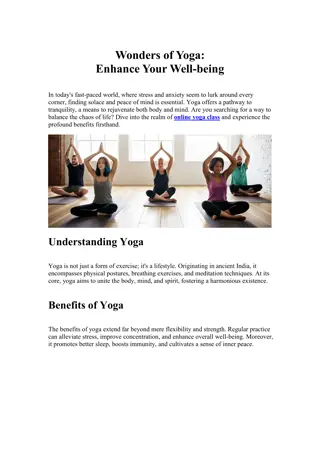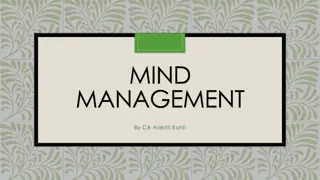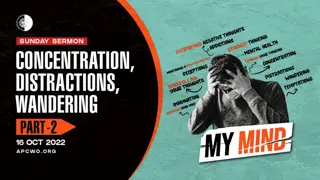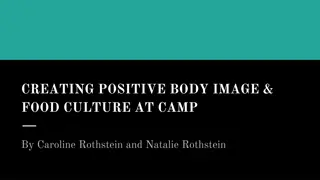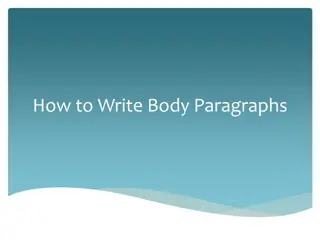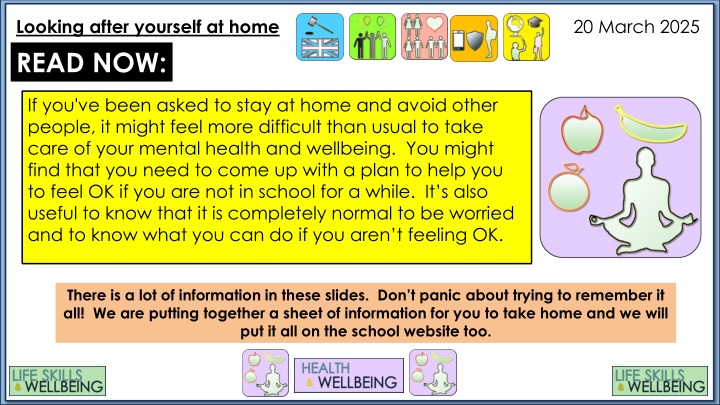
Tips for Maintaining Mental and Physical Health at Home During Isolation
Discover strategies to take care of your mental and physical well-being while staying at home, including advice on healthy eating, exercise, sleep routines, maintaining a tidy environment, and staying connected with others. Learn how to prevent feelings of worry and stress during extended periods at home.
Download Presentation

Please find below an Image/Link to download the presentation.
The content on the website is provided AS IS for your information and personal use only. It may not be sold, licensed, or shared on other websites without obtaining consent from the author. If you encounter any issues during the download, it is possible that the publisher has removed the file from their server.
You are allowed to download the files provided on this website for personal or commercial use, subject to the condition that they are used lawfully. All files are the property of their respective owners.
The content on the website is provided AS IS for your information and personal use only. It may not be sold, licensed, or shared on other websites without obtaining consent from the author.
E N D
Presentation Transcript
Looking after yourself at home 20 March 2025 READ NOW: If you've been asked to stay at home and avoid other people, it might feel more difficult than usual to take care of your mental health and wellbeing. You might find that you need to come up with a plan to help you to feel OK if you are not in school for a while. It s also useful to know that it is completely normal to be worried and to know what you can do if you aren t feeling OK. There is a lot of information in these slides. Don t panic about trying to remember it all! We are putting together a sheet of information for you to take home and we will put it all on the school website too.
Challenge Question: Success criteria: To identify potential concerns or worries To understand how and where to seek help if you are worried or feeling low To think about what you can do to prevent these feelings occuring How do we keep our minds healthy?
Keeping healthy at home On your tables (or in small groups), brainstorm ideas to keep your body and mind as healthy as possible if you have to stay at home for a long period of time. (3 mins) e.g. make sure you drink lots of water Keeping a healthy body and mind Take ideas from the class (2 mins)
Healthy body Remember that keeping your body healthy will not only help to prevent you becoming physically ill, but it will help to support your mental health too. 1. Eat a healthy diet fruit, vegetables, water not all sugar, crisps and fizzy drinks it will make you feel rubbish! And your body will really need vitamins and good energy. Try to stick to a routine with eating breakfast, lunch and dinner and not snacking too much in between. If you do have snacks, try not to have too many or unhealthy ones. Exercise even if you have to stay home you can go into your garden if you have one, if not how can you exercise in your home? (If your parents say it s ok, you may be able to go for a short walk) Sleep when you are asleep your body rests and repairs itself and your brain takes the time to process everything that it needs to. If you get into an unhealthy sleep pattern (i.e. going to bed very late/getting up very late) your body and mind will find it very difficult to work at their best. 2. 3. 4.
Healthy mind Being at home for long periods can cause worry and stress. These are some ideas for you to use at home to ensure that you look after your mental health. 1. Keep your room clean and tidy mess in your environment will have an effect on your mind too Try to give yourself some space family members can be annoying! Build time into the day (just for 30 mins or an hour) where you can be by yourself. You could listen to music, read a book or watch your favourite TV program But don t isolate yourself too much! Make sure you are talking to your friends and family via phone/text etc. if you can t see people face to face If you can go outside to get some sunlight or fresh air then do, if not, try to open windows to get fresh air in and open curtains blind to let the light in. Have a routine. Routines help us to feel more normal when things are weird. What kind of routine could you have at home? Stay busy! On the following slides there will be some ideas of things that you can do to stop you from getting bored. 2. 3. 4. 5. 6.
Keeping busy Keeping busy can really help to pass the time, prevent boredom and generally make us feel better. You will have school work to do, but it won t take up your whole day and it s important that you do other things too. Turn and talk (1 min) what do you enjoy doing at home if you re bored? Ideas: 1. Read a book if you run out of books, the Kindle app is free to download on to any smart phone and there are free books on there too! (There is also a site called Project Gutenberg with free ebooks) Listen to an audiobook again there are sites where these are free StoryNory, Lit2Go, Project Gutenberg and the International Children s Digital Library are a few. Be creative draw, paint, colour in, make a collage or sculpture from rubbish in your home, sew, bake (with help) Make your own project think about the work you did over the summer about the women our forms are named after could you do something similar about someone else you admire? Watch a film or TV program and write a review/blog about it 2. 3. 4. 5. What else did you come up with?
Feeling anxious or stressed? Sometimes situations like this can make us feel anxious or stressed. Here are some ideas of things that might help. If all of the news articles or programs are making you worry, stop watching them or reading them. You don t need to know every update every moment. Your parents will tell you anything that you really need to know. Try to distract yourself with some of the ideas on the previous slide or other things that you like to do. Talk to someone that makes you smile it might be a sibling, family member or friend. This is the perfect opportunity to give someone a call they might be feeling the same! Build a routine for things like washing hands so that you don t become obsessed with it e.g. set an alarm on your phone for every 2 hours and do it then so you won t worry Have a look at the next slide for some suggestions for breathing exercises to help you calm down and some apps that you can download for free to support you.
Staying calm All have a go at high five breathing (this can support you with calming down if you are feeling worried or anxious) There are several apps that you can download for free too: (We will print these for you) Catch it The MeeTwo app provides a safe and secure forum for teenagers wanting to discuss any issue affecting their lives. The app will teach you how to look at problems in a different way, turn negative thoughts into positive ones and improve your mental wellbeing. Learn to relax, manage your worries and improve your wellbeing with Chill Panda
Finally.... Tell your partner the most important thing that you have learnt today and listen to theirs. The key words for this lesson are I always knew ... but now I can see how it connects to Before I only knew ... now I also know ... The most important thing I have learnt today is I m really proud of the way I have I used to feel ... but I now feel .. One assumption of mine that was challenged was I would like to learn A question I would like to ask is One thing I didn t realise was now I know that Before I thought that ... but now I realise.. Today I have tried to Before I would have done Now I will Next lesson I would like to.. I supported others by


![[PDF⚡READ❤ONLINE] Zen Mind, Beginner's Mind: 50th Anniversary Edition](/thumb/20459/pdf-read-online-zen-mind-beginner-s-mind-50th-anniversary-edition.jpg)


